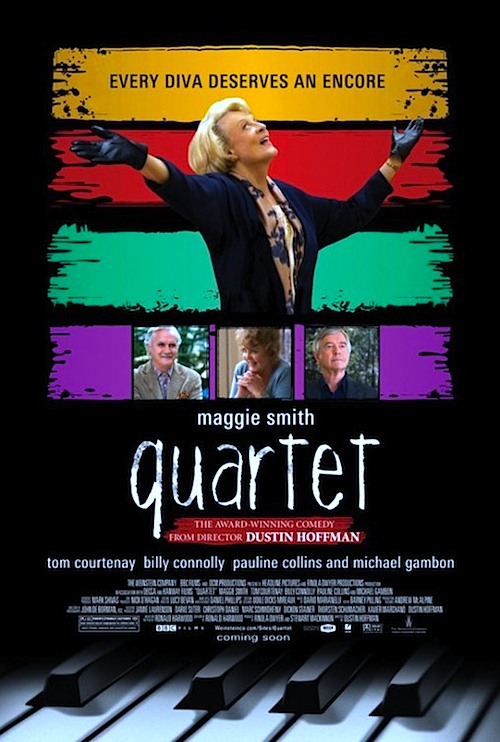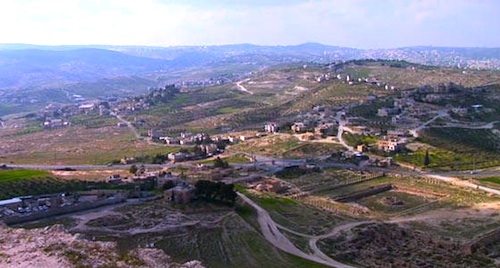By Joe Bendel. In the film adaptation of Neil Simon’s California Suite, Dame Maggie Smith played a beloved English actress, rather embarrassed to be nominated for a lightweight comedic role. She won her second Oscar for that role. Somewhat ironically, Smith is back in Oscar contention for more or less the sort of part Simon’s character was up for. However, the just winner of back-to-back Emmy Awards for Downton Abbey, Smith may not exactly be the sympathetic favorite for Quartet, Dustin Hoffman’s feature directorial debut, which opens today in New York.
Beecham House for retired musicians (mostly classical, aside from a few token big band vets) is anticipating the arrival of a new resident. Jean Horton was the diva of her day. She was also part of the celebrated “Rigoletto Quartet,” whose other three members are already residents of Beecham. Their reunion is the cause of great trepidation for her. Everyone gets along with Wilf Bond, the compulsive old flirt. Likewise, Cissy Robson’s good nature never fails her, but her mind is slowly slipping. Reggie Paget is another story. Still sharp as a tack, he remembers only too well his ill-fated relationship with Horton. Indeed, his bitterness still lingers.
 Will the four former friends be able to put their differences behind them and come together as a quartet to save Beecham House at the annual talent show gala? Are the ponds in New Hampshire still golden?
Will the four former friends be able to put their differences behind them and come together as a quartet to save Beecham House at the annual talent show gala? Are the ponds in New Hampshire still golden?
Smith might be the film’s biggest name, but the Weinsteins shoulld have put Quartet‘s Oscar chips on Tom Courtenay. He brings such exquisite dignity and sophistication to Paget, viewers will long to see him in a film with more heft. Smith is fine as Horton, but the character just seems so bland and pedestrian compared to Downton’s fan favorite, the Dowager Countess. Rounding out the foursome, Billy Connolly is likably roguish as Bond and Pauline Collins is rather sweet and earnest as Robson. There is nothing really wrong about Quartet, per se, except a lack of ambition, essentially amounting up to a bit of Marigold me-too-ism.
No horses were injured in the filming of Quartet, so it has that going for it. Do not expect any surprises, though, in this story of third act pluckiness adequately but not inspiringly helmed by Hoffman. Frankly, there is something slightly frustrating about a film whose most inspired moment is its closing credits, in this case showing vintage photos of its cast of accomplished opera singers, classical musicians, and classically trained thespians early in their careers. Predictable and unabashedly sentimental, Quartet should satisfy those who like sugary, ascot-wearing films (but classical music connoisseurs will be better advised to check out A Late Quartet instead). It opens today (1/11) in New York at the Paris Theatre.
LFM GRADE: C+
Posted on January 11th, 2012 at 10:26am.
